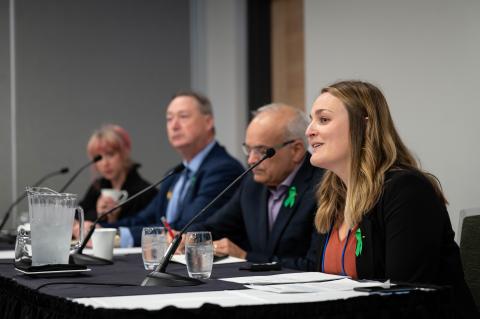Coquitlam Mayor Richard Stewart and Vanderhoof Councillor Brian Frenkel introduced an initiative for local governments, Local Leaders for Mental Health (LLMH), to UBCM convention delegates earlier today. They were joined by Kim Mackenzie, Policy Director with the Canadian Mental Health Association who gave an update on mental health priorities and response strategies in the non-profit sector.
Mayor Stewart said that local governments find themselves at the forefront of the mental health crisis in their communities. He shared that he had met with the Lieutenant Governor, the Honourable Janet Austin to discuss the LLMH initiative, and Her Honour had been planning to be part of the morning’s clinic to express her support. While she was not able to attend due to the death of Queen Elizabeth II, the Lieutenant Governor will continue to support the initiative along with Dr. Bonny Henry, Provincial Health Officer.
Stewart said there is a lack of treatment options at the early stages of illness, and that most people are not able to get treatment until their illness worsens to the equivalent of stage 4. He commented that mental health seems to be treated as “a second-class illness” and local governments usually end up being the first responder through police services. He shared that when his daughter was ill with a panic attack, they called an ambulance and “two guns” showed up. He commented that police are not the best equipped to respond to mental health challenges, they know that, and can sometimes escalate a situation when they show up.
Councillor Frenkel told delegates that small towns have the same concerns as big cities, with the difference that in a small town you know everybody, and the doctors and nurses know the people going through this intimately. As UBCM President during the pandemic, he received calls from local leaders across the Province looking for support.
Kim Mackenzie from the Canadian Mental Health Association shared information about the extent of mental health issues in BC. She advised that mental illness will affect one in 5 people in any given year – close to 900,000 British Columbians. 41% of people in Canada reported a decline in their mental health since the onset of the pandemic and 1 in 5 people in BC in a UBC study reported they needed help with their mental health during the pandemic but didn’t receive it. Of these people, 35% didn’t know how or where to get help.
Ms. Mackenzie said that stigma is one of the biggest barriers for people reaching out for help and outlined the pilot programs of peer-assisted care teams (PACT) with civilian response to mental health crises that can help with early preventative assistance. The initial findings show a huge number of calls diverted away from the police for significant cost savings for local governments.

